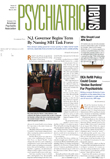Joelle Pauporte, M.D., recalls that day in July 2003 when she awaited the results of a mammogram.
“I knew when the doctor came in that something was wrong,” she told Psychiatric News. “He said that although, as a radiologist, he could not make a full diagnosis, it certainly looked as if I had cancer.
“I was initially shocked, terrified. I called my husband and asked him to come home. Of course he did. He is a physician as well....I don't think that being a psychiatrist helped me control my feelings, at least not initially.
“But because I am a psychiatrist,” she continued, “I think I was able to observe and understand my feelings....I especially felt anxiety, but certainly also depression, secondary to probably an adjustment disorder.”
While she was in the hospital to have a modified radical mastectomy, Pauporte asked staff over and over again, “Am I going to die?,” knowing that no one knew the answer and that she was simply seeking reassurance.
Being a psychiatrist does not necessarily help one cope with the loss of control and dependency that comes with having cancer, Pauporte learned. In fact, from this vantage point, being a psychiatrist may be detrimental since psychiatrists are used to being in control where illness is concerned and caring for others, not being patients themselves.
However, pursuing a meaningful goal while having cancer can help counter feeling out of control and dependent, Pauporte noted. “I realize that my book drive has actually put me back into control. I have started to delegate to other people.”
Certainly, how one reacts to having cancer reveals a person's character, Pauporte discovered. For example, “Within about a month of her starting with us [as chief resident], Joelle received her [cancer] diagnosis,” Harold Schwartz, M.D., psychiatrist in chief at Hartford Hospital, told Psychiatric News. “It was clear from the beginning that she was seriously ill. Nevertheless, and despite the extensive and debilitating process of treatment for her cancer, Joelle hung in with our program, meeting with and teaching our residents whenever her strength allowed. Her personal strength in the face of this challenge has been remarkable. She was determined to graduate from the residency, and she was able to achieve that—becoming the first graduate of the new Institute of Living/Hartford Hospital psychiatry residency training program.”
